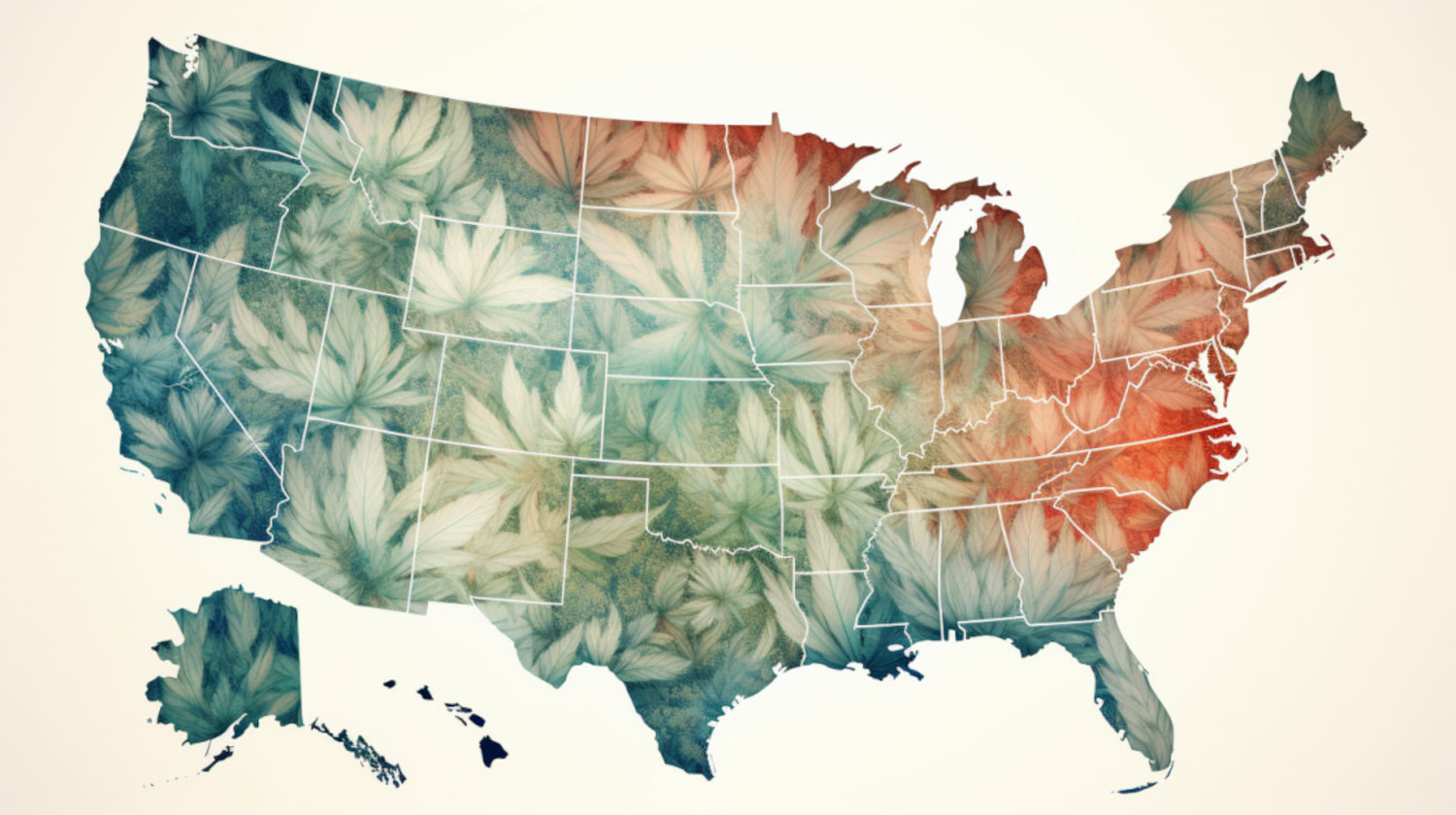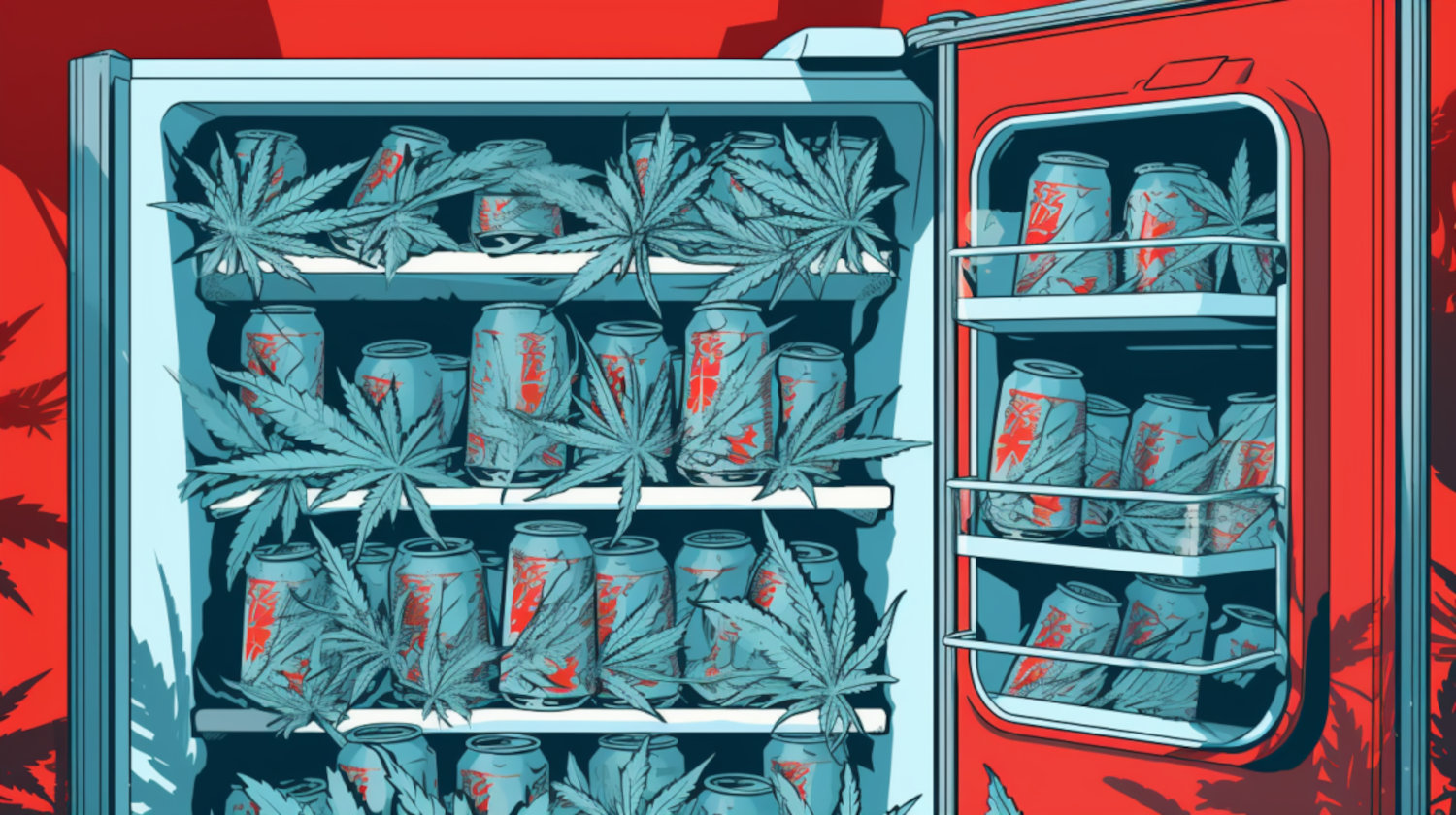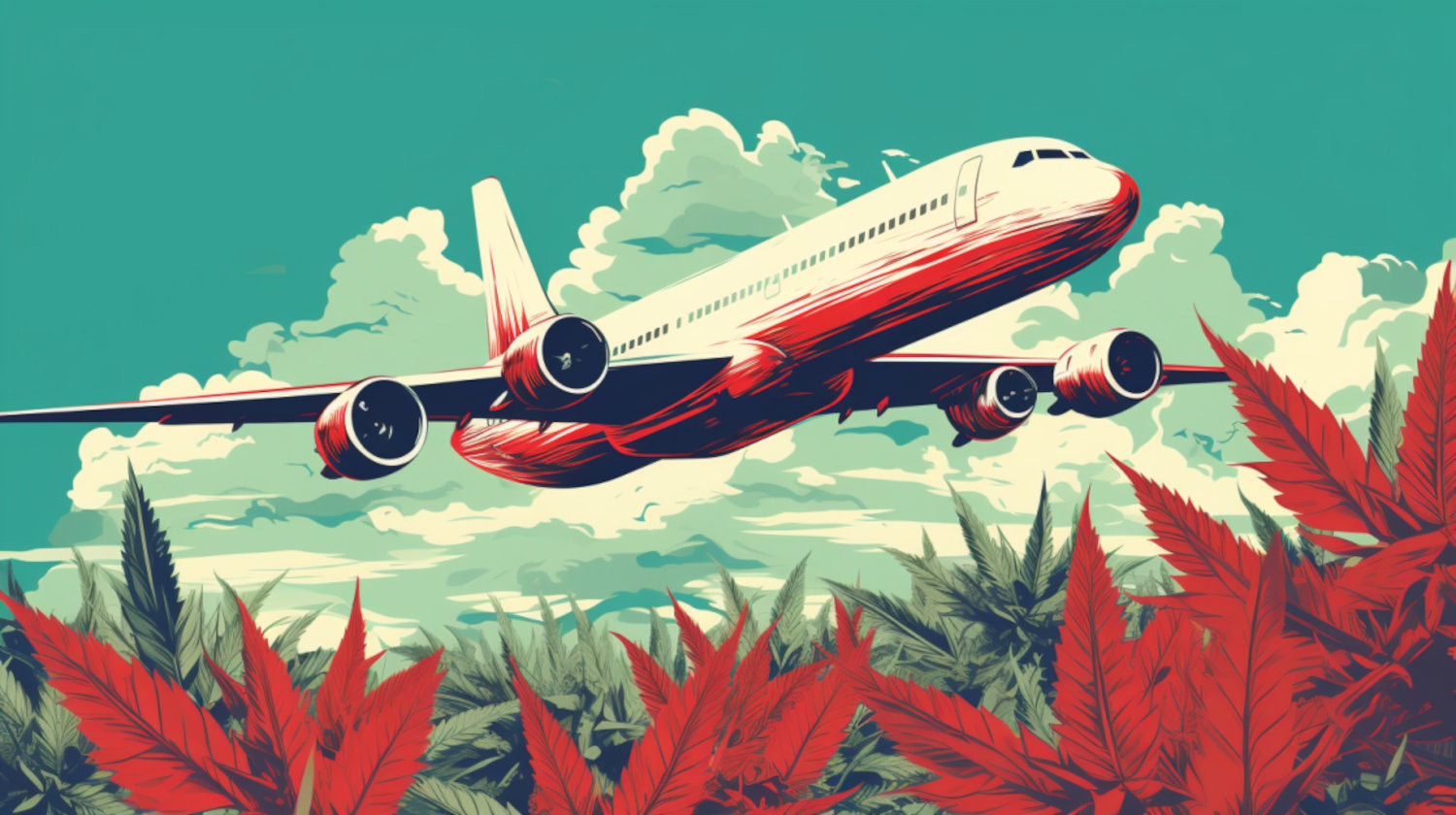In This Article
- What are Edibles?
- Are Edibles Legal? The Differences in Federal and State Laws
- Are Hemp Edibles Legal?
- What About CBD Edibles?
- Where are Edibles Legal?
- Are Restrictions Imposed on Edible Potencies in Certain States?
- Is There a Difference Between Medical and Recreational Products?
- Where Can You Buy Edibles Legally?
- How Old Do You Have to Be to Buy Edibles?
- Making Your Own Edibles
- References
Edibles are gobbling up a sizable chunk of the recreational and medical cannabis markets in the U.S. This subcategory generated more sales figures than any other product type in 2022.
Edibles present a way to experiment beyond traditional smokable cannabis products for longer-lasting effects. A BDSA report found that candy is the best-selling edible, accounting for 71% of sales last year, followed by chocolates, beverages, pills, and infused foods.
So, where are edibles legal, and where can you buy edibles legally?
What are Edibles?
Cannabis edibles are just as they sound – cannabis in edible form. The cannabis plant's primary chemical compounds are extractable (usually in the form of oil) to produce edibles, which can be made from home or commercially produced for dispensary purchases. Popular types of weed edibles include beverages, baked goods, candies, chocolates, gummies, and lozenges.
Based on anecdotal reports, the "high" produced by cannabis edibles is more tranquil and relaxing than the effects associated with smoking. Moreover, edibles don't create the same harmful toxins, unpleasant odors, and health risks associated with smoking cannabis.1 Dosage must be taken into account for safety purposes, mainly since cannabis-infused foods may take longer to release their effects.
Discretion and convenience are two other widespread benefits of cannabis edibles, which also offer palatability, controlled dosing, longer-lasting effects, product diversity, and ease of use. However, it is easy to overindulge in cannabis edibles by misjudging the effects due to delayed onset.
The cannabinoids in edibles must travel through the stomach and liver before they reach the bloodstream, which is why the effects take 30 minutes to two hours to emerge fully. With the correct dosage, consumers can benefit from five to eight hours of remedial relaxation.2
Are Edibles Legal? The Differences in Federal and State Laws

The U.S. Federal Government's stance on cannabis edibles varies depending on the original source and level of THC by weight. In most legal adult-use and medical cannabis states, edibles are permissible for sale, consumption, and home cooking for personal use. However, outside of those legal adult-use and medical cannabis states, any edible containing more than 0.3% THC by weight is illegal.
While many unregulated online and storefront retailers are selling THC-infused edibles, the Food and Drug Administration (FDA) states, "Food companies that wish to use cannabis or cannabis-derived ingredients in their foods are subject to the relevant laws and regulations that govern all food products, including those that relate to the food additive and GRAS processes.” The FDA has, therefore, concluded that it is illegal to sell and ship any food (including any animal food or feed) to which THC or CBD has been added.
In June 2022, the FDA distributed a warning regarding the health risks associated with children ingesting THC-containing foods. The Federal Trade Commission (FTC) demanded companies selling THC edibles to, "Immediately cease marketing edible delta-8 THC products that imitate conventional foods using advertising or packaging that is likely to be appealing to young children."
Are Hemp Edibles Legal?
While some states are not regulating the sale of edibles made from hemp extracts, the FDA is clear that it is illegal to infuse CBD and other hemp-derived cannabinoids into a food product.
What About CBD Edibles?
To answer the question, "Are CBD edibles legal?" will depend on the state and any compounds present in the product. CBD edibles produced from federally legal hemp with less than 0.3% THC by weight are technically illegal per FDA regulations. However, CBD-dominant flower produced by a licensed farm, regardless of the THC level, is permitted to be infused into edible products and sold within the medical or recreational state in which it was produced as long as they meet local regulations like testing and cannabinoid limits.
The FDA recently announced that it is seeking a new regulatory pathway for CBD, with officials stating that "after careful review, the FDA has concluded that a new regulatory pathway for CBD is needed that balances individuals' desire for access to CBD products with the regulatory oversight needed to manage risks." Although the legal framework on CBD edibles is subject to change, consumers ought to approach the market with caution.
Where are Edibles Legal?
Cannabis-infused edibles are legal in an ever-growing list of U.S. states, but certain potency restrictions apply. Limitations usually don't apply to making edibles at home, only to products sold at licensed cannabis dispensaries.
Based on data updated for 2024, there are 24 recreational cannabis states that allow the production and sale of cannabis edibles, including:
- Alaska
- Arizona
- California
- Colorado
- Connecticut
- Delaware
- Illinois
- Maine
- Maryland
- Massachusetts
- Michigan
- Minnesota
- Missouri
- Montana
- Nevada
- New Jersey
- New Mexico
- New York
- Ohio
- Oregon
- Rhode Island
- Vermont
- Virginia
- Washington
On top of these legal recreational markets, cannabis edibles are also available for medical cannabis patients in states that have passed medical cannabis laws.
Those states are:
- Alaska
- Arizona
- Arkansas
- California
- Colorado
- Connecticut
- Delaware
- District of Columbia
- Florida
- Georgia (CBD oil only)
- Hawaii
- Illinois
- Indiana (CBD oil only)
- Iowa (CBD oil only)
- Kentucky (CBD oil only)
- Louisiana
- Maine
- Maryland
- Massachusetts
- Michigan
- Minnesota
- Mississippi
- Missouri
- Montana
- Nevada
- New Hampshire
- New Jersey
- New Mexico
- New York
- North Dakota
- Ohio
- Oklahoma
- Oregon
- Pennsylvania
- Rhode Island
- South Dakota
- Tennessee (CBD oil only)
- Texas (CBD oil only)
- Utah
- Vermont
- Virginia
- Washington
- West Virginia
- Wisconsin (CBD oil only)
Are Restrictions Imposed on Edible Potencies in Certain States?
Currently, only Oregon and Washington impose product weight and volume caps on cannabis edibles. Four other states (Colorado, Illinois, Massachusetts, and Nevada) limit the total number of grams of THC sold via cannabis edibles. Outside these states, a handful set total transaction limits, many of which are product-specific. Alaska is a standalone state regarding cannabis edible limits, with the fully legal state capping THC at 5.6 grams per transaction.
The rules surrounding cannabis edibles are constantly changing with the market. Various online resources, such as the Americans for Safe Access website, offer relevant updates for each state. Staying up-to-date with the latest regulations and restrictions is vital to avoiding unexpected situations.
Medical cannabis patients in Minnesota are celebrating becoming the first in the U.S. to gain access to low-dose THC edibles after Governor Tim Walz signed legislation on May 30th, 2023. Over the next 12-16 months, the state's product selection will flourish further.
Cannabis regulators voted to ease restrictions on edibles in New Jersey in 2023. The move emerged almost a year and a half after the rollout of adult-use cannabis sales across the state.
Is There a Difference Between Medical and Recreational Products?
In most cases, cannabis producers use the same cultivation and production methods for both. The primary distinction lies in how consumers use them. Medical cannabis patients seek relief from qualifying conditions under state-approved programs. Adult-use consumers typically use cannabis for personal enjoyment.
However, product availability and permitted forms can differ from state to state. Some states with legal medical cannabis programs prohibit certain product types, including traditional edibles.
Several medical-only states restrict or ban edibles:
Pennsylvania – Medical cannabis is legal, but dispensaries cannot sell pre-packaged edibles. Patients may incorporate products like oils into food themselves, however.
Alabama – Medical cannabis is legal, but pre-made edible products are not permitted under the state’s medical program.
Utah – Edibles such as candies, cookies, or brownies are banned. Only tablets, capsules, tinctures, and similar formats are allowed.
Georgia – Only low-THC cannabis oil is permitted. Edibles remain prohibited under the state’s limited medical program.
Iowa – The medical program allows oils, capsules, and tinctures, but not infused food products.
Where Can You Buy Edibles Legally?

In states where edibles are legal, buyers of a legal age can easily buy them at dispensaries. There is also the option to purchase edibles online, but a knowledgeable budtender can help with product selection by visiting a dispensary.
Depending on the type of dispensary and the kind of edible products you desire, you will need to have a few things on hand.
If a cannabis dispensary is only open to cardholders, the staff will request a valid government-issued ID and a medical cannabis card. You can browse, sample, and purchase many different types of edibles in a medical cannabis dispensary. Adult-use dispensaries will just require a valid government-issued ID.
How Old Do You Have to Be to Buy Edibles?
Cannabis is hailed as a “wonder drug” by many. However, cannabis does have specific side effects that may not be ideal for young children (mainly due to THC). No fatal cannabis overdoses have been reported, but numerous incidents involving young children consuming high-THC products resulted in adverse reactions.
Dispensaries must operate in accordance with state laws to prevent incidents like this and protect the general public's safety. By imposing age limits on cannabis purchases, dispensary owners and budtender staff can prevent underage people from entering dispensaries and purchasing products. Depending on your state, this age limit may also apply to other CBD hemp-based products.
It's important to note that the age limit for purchasing cannabis edibles differs for medical patients and recreational users. Consumers must be aged 21 and over to purchase cannabis edibles from a recreational dispensary. However, patients as young as 18 may be able to enter a licensed medical cannabis dispensary legally. This does depend on the state, though.3
Regardless of age, any patient who matches one or more of the qualifying conditions listed on their state of residence's eligibility criteria for medical cannabis can obtain plant-based medicines. Patients younger than 18 must seek assistance from a parent or legal guardian; in this case, the patient and caregiver must apply for an MMJ card.
Making Your Own Edibles

Are edibles illegal or legal if you make them at home? It depends on where you live, but if you're in a state with a legal medical or recreational program, you can probably put your cannabis cookbook to use.
If you live in places with edible restrictions, the same rules do not apply when baking at home. For instance, New Jersey banned the sale of most types of edibles – beyond gummies and lozenges – until recently, leaving consumers to make their own edibles at home.
There are numerous benefits to making cannabis edibles from home, as opposed to buying them from a licensed dispensary. Homemade edibles are fun to make and present an opportunity to experiment with flavors, increase potency based on personal preferences, and cater to any allergies or dietary restrictions. Perhaps the most obvious benefit is that you can dabble in your choice of extract, using cannabutter, oil, or wax — or even create edibles utilizing a variety of cannabis strains.
An assortment of controlled-dose edibles can be made from home using simple ingredients and equipment. Edibles can also be frozen and defrosted for consumption at a later date. A few ideas for cannabis-infused foods are:
- Coconut oil cannabutter edibles
- Rice Krispy Treats
- Infused Guacamole
- Or any kind of Game Dip, for that matter
- Classic THC Gummies
- Shake and Bake Sheet Pan Cake
You can purchase some main ingredients — such as the oils, extracts, and raw cannabis flower — from a state-licensed dispensary. Or you can even create THC-rich cannabutter by suffusing some decarbed dispensary-bought flower with a natural carrier oil, such as coconut oil.
If you want to gain peace of mind that your homemade edibles experience does not get you in trouble, research local laws and regulations beforehand.
References
- Barrus DG, Capogrossi KL, Cates SC, et al. Tasty THC: Promises and Challenges of Cannabis Edibles. Methods Rep RTI Press. 2016;2016:10.3768/rtipress.2016.op.0035.1611. doi:10.3768/rtipress.2016.op.0035.1611 ↩︎
- MacCallum CA, Russo EB. Practical considerations in medical cannabis administration and dosing. European Journal of Internal Medicine. 2018;49(49):12-19. doi:https://doi.org/10.1016/j.ejim.2018.01.004 ↩︎
- Borodovsky JT, Budney AJ. Legal cannabis laws, home cultivation, and use of edible cannabis products: A growing relationship? International Journal of Drug Policy. 2017;50:102-110. doi:https://doi.org/10.1016/j.drugpo.2017.09.014 ↩︎
The information in this article and any included images or charts are for educational purposes only. This information is neither a substitute for, nor does it replace, professional legal advice or medical advice, diagnosis, or treatment. If you have any concerns or questions about laws, regulations, or your health, you should always consult with an attorney, physician or other licensed professional.




